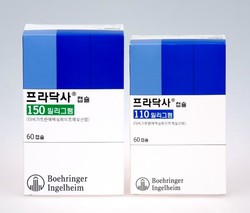Boehringer Ingelheim and Boryung Pharmaceutical have terminated their joint marketing partnership of Pradaxa (ingredient: dabigatran), a new oral anticoagulant (NOAC).

According to the pharmaceutical industry on Monday, the two companies ended their co-promotion contract last year-end.
Pradaxa is a NOAC anticoagulant containing dabigatran. NOAC has attracted attention as a drug with a lower risk of side effects from bleeding and greater prevention of thrombosis than warfarin, an existing anticoagulant. Since the early 2010s, it has replaced warfarin, increasing its influence on the market.
Boehringer Ingelheim obtained approval for Pradaxa in 2011 and launched the drug in 2012. The company initially joined hands with Yuhan Corp. Boehringer Ingelheim sold it to large hospitals and Yuhan Corp. to neighborhood clinics.
The German drugmaker partnered with Boryung Pharmaceutical in 2018.
However, compared to competing drugs, the sales results were somewhat disappointing. While Daiichi Sankyo's Lixiana, Bayer's Xarelto, BMS, and Eliquis recorded averaged 50-60 billion won ($41.8-50.1 million) in outpatient prescriptions a year, Pradaxa recorded less than 15 billion won.
With the joint sales contract termination, Boehringer Ingelheim has decided to sell Pradaxa directly instead of looking for other partners.
However, the outlook for Pradaxa remains uncertain, as it faces challenges from fierce competition, market watchers said.
Daiichi Sankyo's Lixiana and BMS-Pfizer Eliquis exceeded 80 billion won and 60 billion won in sales, respectively, last year.
According to UBIST data, Lixiana recorded 84.8 billion won in prescriptions last year, a 16.3 percent increase from 72.9 billion won from 2020, and Eliquis' prescriptions also increased 18.6 percent to 65.2 billion won.
Eliquis also won the patent dispute with generics developers, eliminating dozens of generic items from the reimbursement list in the second half of last year and recording a steep sales increase.
In contrast, Pradaxa's sales fell more than 7 percent, from 16.5 billion won to 15.2 billion won during the same period.
Pradaxa also faces competition from generic versions after its substance patent expired last July,
Aju Pharm, Jinyang Pharm, Huons, and Intro Biopharma have received permission to introduce generic drugs of Pradaxa in the domestic market, threatening to erode Pradaxa's market share further.

